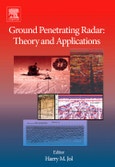Ground-penetrating radar (GPR) is a rapidly developing field that has seen tremendous progress over the past 15 years. The development of GPR spans aspects of geophysical science, technology, and a wide range of scientific and engineering applications. It is the breadth of applications that has made GPR such a valuable tool in the geophysical consulting and geotechnical engineering industries, has lead to its rapid development, and inspired new areas of research in academia. The topic of GPR has gone from not even being mentioned in geophysical texts ten years ago to being the focus of hundreds of research papers and special issues of journals dedicated to the topic. The explosion of primary literature devoted to GPR technology, theory and applications, has lead to a strong demand for an up-to-date synthesis and overview of this rapidly developing field. Because there are specifics in the utilization of GPR for different applications, a review of the current state of development of the applications along with the fundamental theory is required. This book will provide sufficient detail to allow both practitioners and newcomers to the area of GPR to use it as a handbook and primary research reference.
Please Note: This is an On Demand product, delivery may take up to 11 working days after payment has been received.
Table of Contents
Part I: Ground Penetrating Radar (GPR)Principles
Chapter 1: Electromagnetic Principles of Ground Penetrating Radar
Chapter 2: Electrical and Magnetic Properties of Rocks, Soils and Fluids
Chapter 3: Ground Penetrating Radar Systems and Design
Chapter 4: Antennas
Chapter 5: Ground Penetrating Radar Data Processing, Modelling and Analysis
Part II: Environmental Applications
Chapter 6: Soils, Peatlands, and Biomonitoring
Chapter 7: The Contribution of Ground Penetrating Radar to Water Resource Research
Chapter 8: Contaminant Mapping
Part III: Earth Science Applications
Chapter 9: Ground Penetrating Radar in Aeolian Dune Sands
Chapter 10: Coastal Environments
Chapter 11: Advances in Fluvial Sedimentology using GPR
Chapter 12: Glaciers and Ice Sheets
Part IV: Engineering and Societal Applications
Chapter 13: NDT Transportation
Chapter 14: Landmine and Unexploded Ordnance Detection and Classification with Ground Penetrating Radar
Chapter 15: GPR Archaeometry
Index
Errata








